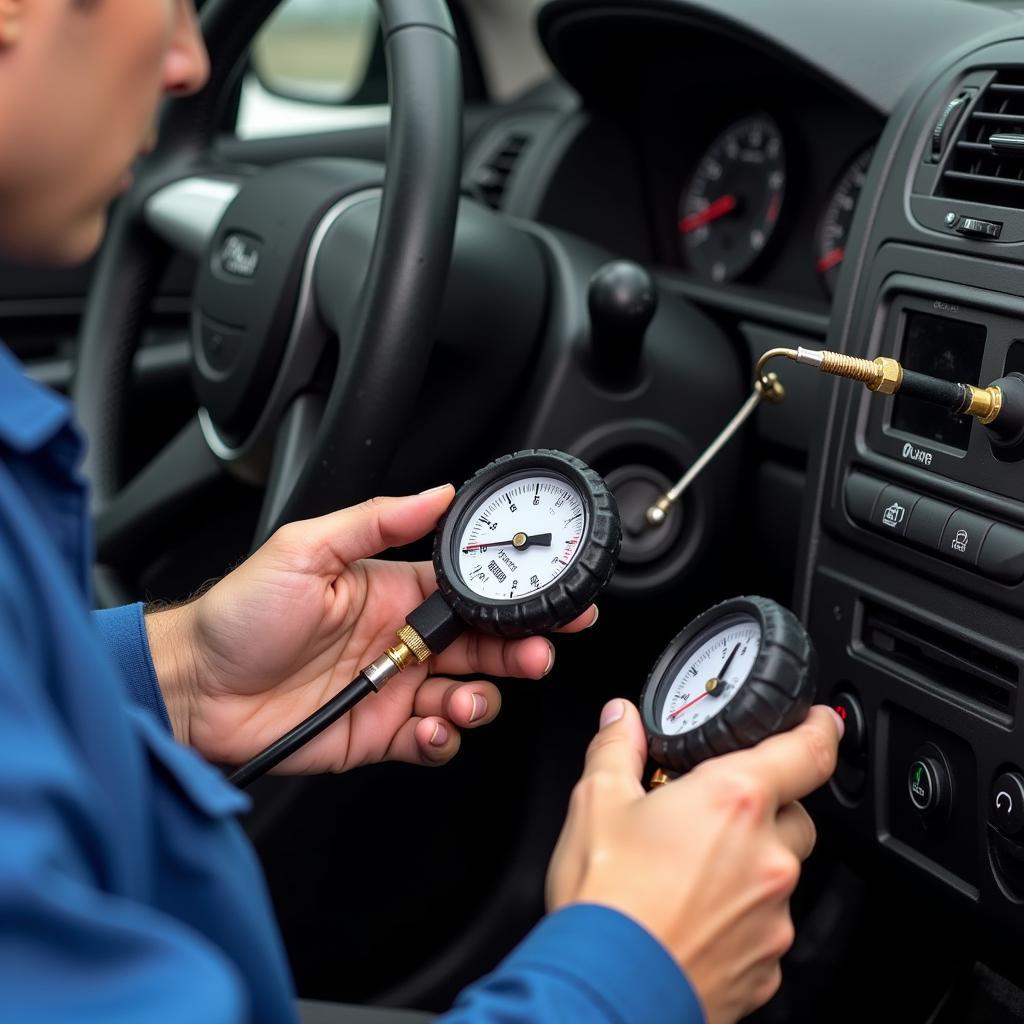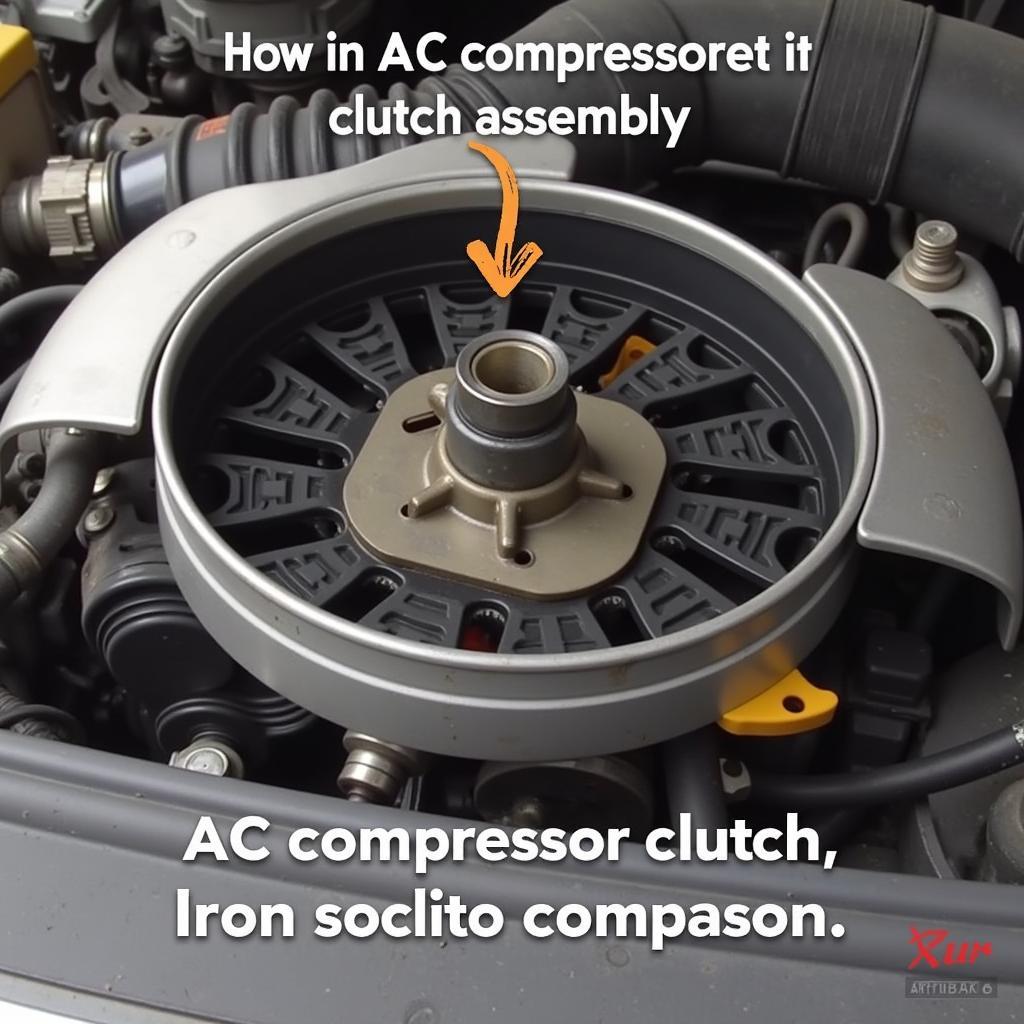A car’s air conditioning system can be a lifesaver, especially during hot summer months. But what happens when it fails? This article provides a comprehensive guide on How To Diagnose A/c Problems In Car, empowering you to troubleshoot and identify the root cause of your car AC issues.
Understanding the basics of your car’s AC system is the first step to effective troubleshooting. The system consists of several key components, including the compressor, condenser, evaporator, expansion valve or orifice tube, and receiver-drier. Each part plays a vital role, and a malfunction in any one can lead to a variety of problems, from weak airflow to complete system failure. Are you experiencing lukewarm air, strange noises, or no cool air at all? Let’s dive into the diagnostic process.
Identifying Common A/C Problems in Car
Before you start tearing into your car’s AC system, it’s essential to understand the symptoms. Is the air blowing weakly? Is it just not cold enough? Or is there no air coming out at all? These different symptoms can point to different problems. For instance, low refrigerant could result in weak, cool air, while a faulty compressor might produce no cool air and unusual noises. Identifying the precise symptoms will significantly narrow down your search for the culprit.
 Checking Refrigerant Levels in Car AC
Checking Refrigerant Levels in Car AC
Checking the Refrigerant: A Crucial Step in A/C Diagnostics
One of the most common causes of AC problems is low refrigerant. A leak in the system can gradually deplete the refrigerant levels, leading to reduced cooling performance. You can check the refrigerant level using a pressure gauge, which is readily available at most auto parts stores. However, if you’re not comfortable working with refrigerants, it’s always best to consult a qualified technician. Remember, refrigerant is a specialized substance and needs to be handled with care.
Inspecting the Compressor and Other Components
The compressor is the heart of the AC system, responsible for compressing and circulating the refrigerant. A failing compressor can manifest in several ways, including loud noises, no cool air, or a seized clutch. Similarly, problems with the condenser, evaporator, expansion valve, or receiver-drier can also disrupt the cooling process. A visual inspection of these components can often reveal obvious signs of damage, such as leaks, corrosion, or broken parts. If you suspect a compressor issue, check its clutch for proper engagement. If the clutch isn’t engaging, the compressor won’t function, leading to no cool air.
 Checking the Car AC Compressor Clutch
Checking the Car AC Compressor Clutch
Similarly, solenoid problems car can indirectly affect your AC. While not directly part of the AC system, a faulty solenoid can disrupt the engine’s performance, which in turn can affect the AC compressor’s ability to function correctly. A healthy engine ensures the compressor receives the necessary power to operate effectively.
If you’re experiencing rpm problem car cd player, it might seem unrelated to your AC. However, electrical issues can sometimes be interconnected, and a problem with the car’s electrical system could also affect the AC system. Thoroughly checking all related systems can help uncover hidden connections.
DIY vs. Professional A/C Repair
While some AC problems can be easily diagnosed and fixed at home, others require specialized tools and expertise. If you’re comfortable with basic car maintenance, you can certainly try troubleshooting simple issues like low refrigerant or a blown fuse. However, for more complex problems like compressor failure or electrical issues, it’s always best to seek the help of a qualified automotive air conditioning technician. They have the necessary knowledge and equipment to diagnose and repair even the most challenging AC problems.
Just as knowing the car makes problems per year can inform your purchasing decisions, understanding the potential issues with your car’s AC system can help you maintain it effectively. Regular checks and preventive maintenance can prevent many common AC problems, saving you time and money in the long run. Knowing the common issues associated with your specific car model can give you a head start in diagnosing and addressing AC problems.
Remember, a well-functioning AC system is not just about comfort; it also plays a crucial role in defogging your windshield during cold or humid weather. A properly functioning AC system ensures clear visibility, which is essential for safe driving.
Conclusion: Keeping Your Car Cool
Diagnosing a/c problems in car can be a challenging task, but with a systematic approach and a bit of patience, you can often pinpoint the root cause. Start by identifying the specific symptoms, then check the refrigerant level and inspect the key components. Don’t hesitate to seek professional help if you’re unsure about anything. Regular maintenance and timely repairs can keep your car’s AC system running smoothly, ensuring a comfortable and safe driving experience. For further assistance with your car AC or other automotive issues, connect with AutoTipPro at +1 (641) 206-8880 or visit our office at 500 N St Mary’s St, San Antonio, TX 78205, United States. We’re here to help you keep your car cool and running smoothly!
Do you have further questions about diagnosing a/c problems in car? Check out our FAQ section below for more information. You might find answers to your specific questions, helping you further understand the intricacies of your car’s AC system and how to maintain it effectively. Learning how to maintain your AC is just as important as knowing how to diagnose a/c problems in car. Preventative measures can save you time, money, and frustration in the long run.
FAQ
-
What are the most common signs of AC problems in a car? Common signs include weak or warm airflow, unusual noises coming from the AC system, and a foul odor.
-
Can I recharge my car’s AC system myself? While it’s possible, it’s recommended to have a professional do it to ensure proper refrigerant handling and system check-up.
-
How often should I have my car’s AC system serviced? It’s generally recommended to have your AC system checked annually or as part of your regular car maintenance schedule.
-
What is the average lifespan of a car AC compressor? The average lifespan varies, but it’s typically between 80,000 to 150,000 miles.
-
Why is my car AC blowing hot air only on one side? This could indicate a blend door actuator problem, which controls the temperature and direction of airflow.
-
Can a clogged cabin air filter affect my AC performance? Yes, a clogged cabin air filter can restrict airflow and reduce cooling efficiency.
-
How can I prevent future a/c problems in car? Regular maintenance, including checking refrigerant levels, inspecting belts and hoses, and cleaning the condenser, can help prevent many AC issues.






Leave a Reply